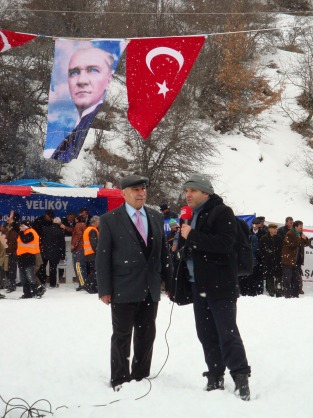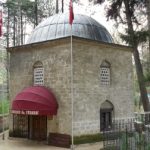Last year I made a hare-brained dash to Şavşat in northeastern Turkey in the depths of winter. The reason? Nearby Veliköy is the one village in the country where men engage in the deeply un-Turkish sport of kar güreşi (snow wrestling).
I say deeply un-Turkish because anyone who has lived here for any length of time soon comes to understand the morbid Turkish dread of a draught. Heaven forbid that a child should be served a glass of iced cola, a guaranteed recipe for pneumonia. Even in the height of summer old women can be heard demanding that the driver close his window for fear that they should freeze. Yet here we were, in the middle of February in a field in the middle of nowhere with snow feet deep all around us and more falling, and yet men were proposing to strip down to their (relative) shorts and step out to grapple with each amid the whiteness.
In such circumstances it goes without saying that all any sane person would want was to be allowed to watch the wrestling for as short a time as was required to identify a winner before rushing home to a seat by the fire. But no, this was Turkey and so instead we first had to endure a litany of tedious speeches featuring everyone from the local Vali (Governor) and Kaymakam (Less Important Governor) to the man who first dreamt up this madness. One by one they strode out from the tent that had been rigged up with a small electric fire to keep their eminent toes from freezing to read their speeches from a lectern on the far side of the snow-filled arena. Meanwhile the rest of us were reduced to blowing on our hands and stamping up and down in an attempt to keep the circulation flowing.
Just imagine any official in England having the audacity to try this, I thought. There would surely be a riot.
I was reminded of this recently while attending an event at Nevşehir University to celebrate Nevruz, or the start of spring. The advertising poster featured pictures of purple irises. It featured pictures of happy dancing folks from Kazakhstan. What it did not feature was pictures of the university rector, the rector of a Kazak University, the Kazak Ambassador and assorted other bods who all had to put in their two-pennorth on the subject of spring and the love and friendship between Turkey and Kazakhstan before we poor, trapped would-be spectators could be permitted to see the entertainment we had been promised.
Forewarned should be forearmed, so last year I attempted to save myself a good half-hour of tedious pontification before a performance at the Side International Culture and Art Festival. The programme gave 8.30 as the starting time. I’ll get there at 9 pm, I thought smugly. That way I’ll miss the speeches.
But alas the security guards who are a ubiquitous feature of modern Turkish life had other ideas. “You’ll have to wait outside,” they told me firmly, which is how come I only got to see the spectacular dance troupe Lezginka from Daghestan from a view-impeded sideways-on position.
All this leads me to believe that it might be possible to draw up a scale for measuring the degree of democracy in a country based on when and for how long local bigwigs are allowed to hold the masses captive to their diatribes. In a true democracy they’d only be allowed to say their piece at the end of the event, thereby freeing participants to sneak away before they started. Of course in Turkey they’d still manage to stump us by instructing the guards to prevent anyone from leaving before they’d finished but at least then we could doze in our seats without being afraid of missing anything.
Written: 26 April 2013

